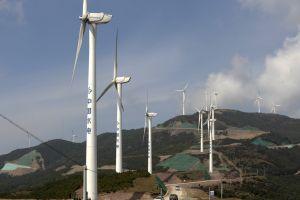China syndromeObama blocks purchase of U.S. wind farms by Chinese company
Last Friday President Barack Obama blocked a Chinese company from owning four wind farm projects in northern Oregon; Obama cited security risks for the action, making it the first time in twenty-two years that a U.S. president has blocked a foreign business deal

Obama blocks Chinese ownership of windfarm adjacent to naval weapons center // Source: luatgiaiphong.com
Last Friday, President Barack Obama blocked a Chinese company from owning four wind farm projects in northern Oregon.
Obama cited security risks for the action, making it the first time in twenty-two years that a U.S. president has blocked this kind of foreign business deal.
Military & Aerospace Electronicsreports that Obama’s decision most likely will negatively affect an already tense relationship between the United States and China. The move may have been influenced by the upcoming election and Republican candidate Mitt Romney, who accused Obama of not being tough enough with China.
In his decision, Obama ordered Ralls Corp., a company owned by Chinese nationals, to divest its interest in the wind farms it purchased earlier this year near the Naval Weapons Systems Training Facility in Boardman, Oregon.
Earlier this month, Ralls sued the U.S. Committee on Foreign Investments in the United States (CFIUS), charging the panel with exceeding its authority when it ordered the company to cease operations and withdraw from the wind-farm developments it had bought. The company has asked for a restraining order as well as a temporary injunction to allow the construction to continue. Ralls dropped the injunction request last week after CFIUS allowed them to resume some pre-construction work, but the suit is continuing
Tim Kia, a lawyer for the firm, said the project does not pose a security threat of any kind, and said that “the President’s order is without justification, as scores of other wind turbines already operate in the area.”
The case was brought to Obama after CFIUS concluded there was no way for panel to assess the potential national security risks posed by the Chinese company’s purchases. Only the president has the authority to void a transaction.
Obama’s administration would not say what risks the farms posed.
Carla McLane, the Morrow County planner, said the projects won approval and construction started until CFIUS issued an order in July, which suspended construction. McLane says she does not understand what the security concerns were.
Each of the four projects contains five turbines with a two megawatt capacity for a total of forty megawatts in the entire set.
The military has acknowledged that it uses the Oregon Naval facility to test unmanned drones and other aircrafts. At the site, planes fly as low as 200 feet and as fast as 300 miles per hour.
The Treasury Department said in a statement that Obama’s decision is specific to this transaction and is not an example of future foreign direct investments in the United States by China or any other country.
The last time a president blocked a commercial transaction was 1990, when President George H. W. Bush voided the sale of Mamco Manufacturing to a Chinese agency.
The president, under the Defense Production Act, has the power to block or void commercial transactions involving foreign nationals or companies. The act authorizes the president to suspend or prohibit acquisitions of U.S. businesses if there is credible evidence that the foreign purchaser might take action that harms or threatens to impair national security.
